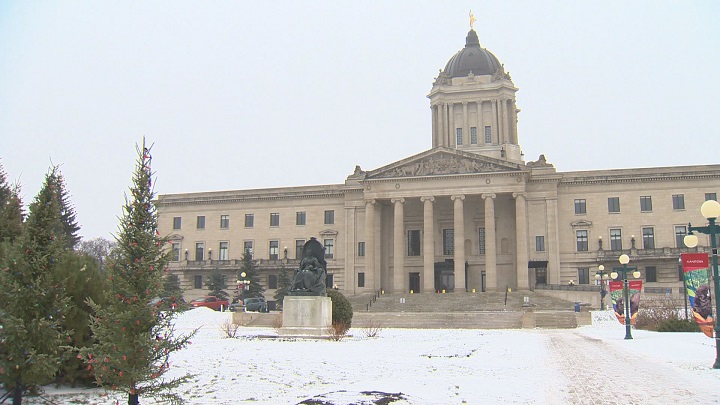If you drive a car, own a home or like to barbecue, you are going to find less money in your pocket starting Sept. 1.

The province revealed more details about the upcoming carbon tax in their 2018 budget, tabled Monday at the Manitoba Legislature.
For the average family, carbon taxes will cost an extra $240 annually through gasoline and natural gas. That doesn’t include any increases they will see at the cash register as businesses try to recover their extra costs.
Gasoline will increase 5.32 cents per litre. Natural gas will increase by 4.74 cents per cubic metre. Diesel will increase the most by 6.71 – propane the least at 3.87.
The “Made-in-Manitoba” carbon tax Premier Brian Pallister introduced will see a $25 per tonne increase beginning Sept. 1.
READ MORE: 50 per cent of Manitobans opposed to carbon tax: survey
The province is expecting to generate $250 million in revenue over 12 months.
Finance Minister Cameron Friesen said that all the money brought in through the carbon tax over the next four years will be returned to Manitobans through tax reductions.
One way that money will come back is through an increase to the basic personal amount next year and the year after. By 2020, Manitobans won’t have to pay taxes on their first $11,400 of income.
It is expected to save taxpayers an extra $218 over the next two years. It will also remove an estimated 30,000 Manitobans from the tax roll.
“This is about keeping our promises. This is about managing our expenditures. This is about allowing Manitobans to keep more of their hard-earned money,” Friesen said.

Get breaking National news
Last year, the government indexed income tax brackets to inflation to help combat bracket creep. That will continue in the upcoming tax year.
The threshold for small businesses to start paying taxes will increase from $450,000 to $500,000.
RELATED: Province unveils four companies approved to sell pot in Manitoba
Even though marijuana will be legal this budget year, the province is not budgeting for any pot revenue. It says there are too many unanswered questions around the implementation date and federal rules.
The PCs are still promising to reduce the PST back down to 7 per cent by 2020 – the end of their first term.
Education and Day Care
Post-secondary institutions are taking a hit in this budget. Funding to colleges and universities is down almost one per cent.
Friesen said the government asked post-secondary institutions to make up that one per cent through other forms of revenue like tuition increases.
“We’re talking about the equivalent of eight dollars per month per student,” he said.
The PC government scrapped the NDP measure to freeze tuition fee increases to the rate of inflation in 2016.
Post-secondary students are also no longer eligible for a tuition rebate if they stay in Manitoba to work.
Some better news for younger students — construction is expected to start on five new schools, four of which will be in Winnipeg.
Waverley West will get two new schools (a K-8 school and a high school), the Winnipeg School Division will get a new K-8 school in Waterford Green, Seven Oaks School Division will get a primary school and Southeast Brandon will get a new K-8 school.
Overall spending on education is increasing by just 0.9 per cent.
RELATED: More $ for high-quality, affordable child care: Manitoba families minister
To help address the day care crunch, the province is trying to incentivise employers to open day care spaces in their offices. It will offer a $10,000 tax credit incentive per child over five years.
More than 700 new child care spaces will be funded or built in this budget.
Deficit
The provincial summary deficit currently sits at $726 million. By the end of this budget year, it’s projected to decrease by about $200 million to $521 million.
The PCs say they’re still committed to eliminating the deficit by 2024 – potentially the end of their second term.
RELATED: Manitoba’s deficit forecasted to be less than $1 billion: Fiscal update
The amount the province will pay to service its debt will eclipse a billion dollars this year.
But they are still putting some money in the government’s rainy day fund: $50 million will be invested in a pot that already includes $125 million.
Spending on Roads
The province will be spending less money fixing roads. Last budget year, $502 million was budgeted, but it’s down to $350 million this year.
The amount the province is giving to municipalities this year is flat: $312 million ($115.5 of which will be for Winnipeg). Municipalities will have to decide in their budgets how much money will be prioritized on roads.
RELATED: Manitoba government getting more federal money, film tax credit under review
Other budget items of note:
- Health care spending is increasing by about one per cent in this budget.
- Ambulance fees will be reduced from $425 to $340 starting April 1. Despite this decrease, they are looking to put 60 more full-time paramedics on the road.
- The province is spending $102 million to establish a conservation trust to help achieve the goals in its climate strategy. The fund will be managed by the Winnipeg Foundation and administered by the Manitoba Habitat Heritage Corporation.
- The film tax credit remains this year, but a working group will be established to help determine its future.







Comments